Proteus: Prophetic Greek Sea God Who Knew All Things, Past, Present And Future
A. Sutherland - AncientPages.com - In Greek mythology, Proteus was a sea god, son of Poseidon and Tethys, and sometimes said to be Poseidon's attendant.
His name probably means "firstborn," "first," or "primordial," and he belongs to the so-called "sea elders."
Aristaeus fettering Proteus by Sébastien Slodtz (1655–1726). Palace of Versailles. Source
Like many other gods of the sea, Proteus was an amphibious being, which means these gods could live alternately in the water and on land. Proteus was believed to live on Faros (Pharos) island in ancient times, an island off Alexandria, Egypt. Like many other sea gods, he was a divine being but did not give up his knowledge voluntarily.
He had the gift of foretelling the future and knew the past, present, and future; time had no secret for him. He also could change his form at will hence the expression "protean shape" (resembling Proteus in having a varied nature or avoiding those who wanted to question him by changing his shape). In modern times, a changeable human can be called "a Proteus nature."
As Proteus could transform, he was, therefore, challenging to defeat. He could change his form rapidly into a snake, lion, snake, panther, and much more, and he did it very often to avoid being questioned. In this case, Proteus gave no answers to all the insistent questions.
In Odyssey, the legendary Greek author Homer described Proteus as an 'elder man of the sea' who has the habit of emerging from the sea at noon to rest in the shadow of the rocks, surrounded by the flock of Poseidon's seals. As legend has, it was the most proper time to approach him to get some advice or prophecy from the diviner.
 Illustration of Proteus by Andrea Alciato from The Book of Emblems (1531) Public Domain
Illustration of Proteus by Andrea Alciato from The Book of Emblems (1531) Public Domain
However, it was not easy to force him to do so since he was powerful and volatile like the sea, and even if he exercised the gift of prophecy, he did it most reluctantly.
Menelaus' Encounter With Proteus
Among those who managed to obtain a prophecy from Proteus was Aristaeus, the god of bee-keeping and son of Apollo and the huntress Cyrene. Once, Aristaeus lost all his bees because of a disease. His mother, Cyrene, said that Proteus could explain how to prevent another such disaster but would only do so if compelled. Aristaeus had to seize Proteus and hold him, no matter what kind of disguise he chose.
Finally, Proteus gave up and told him that the bees' death was a punishment for causing the death of Eurydice. To make amends, Aristaeus needed to sacrifice 12 animals to the gods, leave the carcasses in the place of sacrifice, and return three days later. He followed these instructions, and upon returning, he found a swarm of bees in one of the carcasses that he took to his apiary.
The bees were never again troubled by disease.
Also, Menelaus, the Spartan king, got advice from Proteus, who explained what was needed to return from Egypt to Sparta.
"After the Trojan War, Menelaus, king of Sparta, and Agamemnon king of Mycenae were about to sail back to Greece, when Menelaus said:
'Let's sail once, while there is a breeze.', But his brother Agamemnon disagreed with him:
'No, no, let's make a sacrifice to Athena first.'
'We Greeks, we don't owe Athena anything!' 'She defended the Trojan citadel too long,' Menelaus said.
The two brothers had very different opinions. They separated and unfortunately never saw each other again.
Proteus, A Greek Sea God Who Possessed is a drawing by Mary Evans Picture Library which was uploaded on January 10th, 2018. source
Agamemnon, Diomedes, and Nestor had a successful journey back home, while Menelaus was surprised by a storm that Athena had sent, and he lost all his ships except five. These were taken to Crete, where Menelaus crossed the sea to Egypt and spent eight years in the southern waters, but he could not sail home without good winds. He visited Cyprus, Ethiopia, Phoenicia, and Libya and was treated with honor and hospitality.
Finally, Menelaus arrived at the island of Faros, where he met the sea-nymph Eidoethea. She told him that he must capture her father, Proteus, the shepherd of fish and other sea animals. She said her father knew everything, past, present, and future. Proteus would tell Menelaus how to raise good winds to sail home.
Eidoethea explained that Proteus would rise from the waters to the zephyr's breath when the sun is in the middle of its path. He will first count the seals (Proteus' favorite animals) in groups of five, and after this, he will lie in their midst like a shepherd among his flock. She instructed Menelaus on what to do and then disappeared into the sea.
The following day, Menelaus and three companions disguised themselves as seals and lay waiting on the shore until they were joined at midday by hundreds of seals, Proteus's flock. The Proteus emerged from the sea and went to sleep among the seals: so Menelaus could seize him. Proteus tried to escape by changing form. He turned successively into a lion, serpent, panther, boar, a stream, but it did not help.
At last, Proteus resumed his original form and asked Menelaus what he wanted from him. The king said that he was searching for the latest news of events in Greece to be ready for his return. Proteus told him his kingdom was safe, but his brother Agamemnon had been murdered in Mycenae, and Odysseus was being held against his will by the sea-nymph Calypso.
The older man of the sea also advised the hero to return as soon as possible to Egypt and make a sacrifice to the gods, and so Menelaus did.
A wind, for which they all were waiting so long, finally reached them, and they could sail home.
Written by – A. Sutherland - AncientPages.com Senior Staff Writer
Updated on January 22, 2024
Copyright © AncientPages.com All rights reserved. This material may not be published, broadcast, rewritten or redistributed in whole or part without the express written permission of AncientPages.com
Expand for referencesReferences:
Freeman Ph. Oh My Gods: A Modern Retelling of Greek and Roman Myths
Robert Graves, The Greek Myths
More From Ancient Pages
-
 Secrets Of Ninja Swords – Favorite Weapon Of The Shinobi
Featured Stories | Aug 13, 2018
Secrets Of Ninja Swords – Favorite Weapon Of The Shinobi
Featured Stories | Aug 13, 2018 -
 Homo Erectus Was Too Lazy And Went Extinct
Archaeology | Aug 14, 2018
Homo Erectus Was Too Lazy And Went Extinct
Archaeology | Aug 14, 2018 -
 Legendary Mount Penglai Where The Eight Immortals Reside
Chinese Mythology | Feb 20, 2018
Legendary Mount Penglai Where The Eight Immortals Reside
Chinese Mythology | Feb 20, 2018 -
 Mysterious Headless Skeleton May Be Sir George Yeardley – The Man Who Shaped Early America
Archaeology | Aug 11, 2018
Mysterious Headless Skeleton May Be Sir George Yeardley – The Man Who Shaped Early America
Archaeology | Aug 11, 2018 -
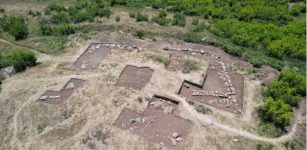 2,000-Year-Old Lost City Of Bassania Described By Roman Historian Livy Investigated By Archaeologists
Archaeology | Jun 21, 2022
2,000-Year-Old Lost City Of Bassania Described By Roman Historian Livy Investigated By Archaeologists
Archaeology | Jun 21, 2022 -
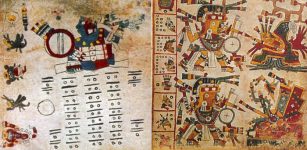 Ancient Codex Cospi: Intriguing Pre-Columbian Ritual Manuscript From Central Mexico
Featured Stories | Aug 10, 2017
Ancient Codex Cospi: Intriguing Pre-Columbian Ritual Manuscript From Central Mexico
Featured Stories | Aug 10, 2017 -
 Unexplained Ancient Wars In America – Strange Physical Evidence – Part 2
Ancient Mysteries | Oct 4, 2020
Unexplained Ancient Wars In America – Strange Physical Evidence – Part 2
Ancient Mysteries | Oct 4, 2020 -
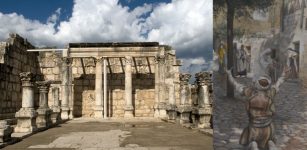 Capernaum – Was The City On The Sea Jesus’ Home?
Biblical Mysteries | Jan 25, 2019
Capernaum – Was The City On The Sea Jesus’ Home?
Biblical Mysteries | Jan 25, 2019 -
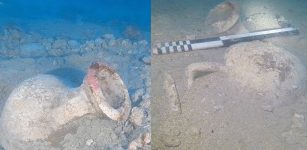 2,ooo-Year-Old Ancient Roman Treasure Found Underwater Of The Coast Of Portofino, Italy
Archaeology | Jan 31, 2019
2,ooo-Year-Old Ancient Roman Treasure Found Underwater Of The Coast Of Portofino, Italy
Archaeology | Jan 31, 2019 -
 Easter Island’s Society Was Sophisticated And Its People Shared Information And Collaborated
Archaeology | Aug 14, 2018
Easter Island’s Society Was Sophisticated And Its People Shared Information And Collaborated
Archaeology | Aug 14, 2018 -
 Ancient Feneos excavations: defensive walls, five towers, sanctuary unearthed
Civilizations | Aug 23, 2015
Ancient Feneos excavations: defensive walls, five towers, sanctuary unearthed
Civilizations | Aug 23, 2015 -
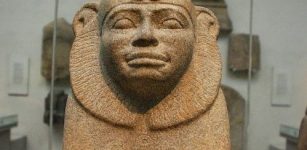 Taharqa – The Most Powerful Of The Black Pharaohs
Featured Stories | Jan 29, 2016
Taharqa – The Most Powerful Of The Black Pharaohs
Featured Stories | Jan 29, 2016 -
 Cursed Magical Dainsleif Sword Of King Hogni And Legendary Battle That Continues Until The Coming Of Ragnarok
Featured Stories | Jul 21, 2018
Cursed Magical Dainsleif Sword Of King Hogni And Legendary Battle That Continues Until The Coming Of Ragnarok
Featured Stories | Jul 21, 2018 -
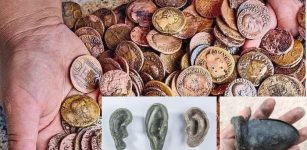 Extraordinary Etruscan And Roman Treasure Trove Unearthed In San Casciano dei Bagni, Italy
Archaeology | Aug 12, 2022
Extraordinary Etruscan And Roman Treasure Trove Unearthed In San Casciano dei Bagni, Italy
Archaeology | Aug 12, 2022 -
 Maya Site With At Least 300 Buildings Some Of Which Are Over 8 Meters High – Discovered
Archaeology | Sep 16, 2022
Maya Site With At Least 300 Buildings Some Of Which Are Over 8 Meters High – Discovered
Archaeology | Sep 16, 2022 -
 LIDAR Reveals Secrets Of The Enormous Ancient Maya City Of Calakmul
Archaeology | Oct 31, 2022
LIDAR Reveals Secrets Of The Enormous Ancient Maya City Of Calakmul
Archaeology | Oct 31, 2022 -
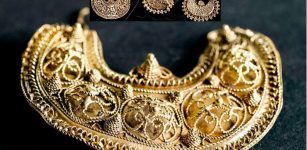 Unique 1,000-Year-Old Medieval Golden Treasure Unearthed By Dutch Historian Using Metal Detector
Archaeology | Mar 24, 2023
Unique 1,000-Year-Old Medieval Golden Treasure Unearthed By Dutch Historian Using Metal Detector
Archaeology | Mar 24, 2023 -
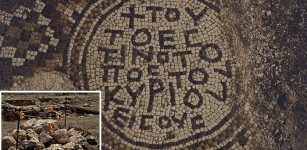 The 6th Century Byzantine Church Hidden Within Khirbet Tinshemet’s Woods – Discovered
Archaeology | Oct 2, 2024
The 6th Century Byzantine Church Hidden Within Khirbet Tinshemet’s Woods – Discovered
Archaeology | Oct 2, 2024 -
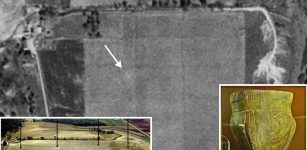 Long-Lost Ancient Burial Mounds Of The Havana Hopewell Culture Re-Discovered In Iowa
Archaeology | Apr 6, 2021
Long-Lost Ancient Burial Mounds Of The Havana Hopewell Culture Re-Discovered In Iowa
Archaeology | Apr 6, 2021 -
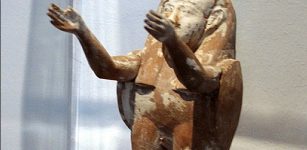 Ancient Beliefs About The Soul
Civilizations | Mar 8, 2016
Ancient Beliefs About The Soul
Civilizations | Mar 8, 2016


